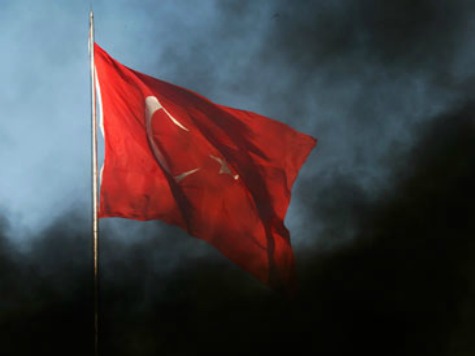Turkey has finally caved in to American pressure and announced it will allow Kurdish Peshmerga fighters to cross over its territory from Iraq to Syria to join the battle against ISIS. But anyone who imagines this grudging concession represents a cooperative move by a Nato ally to help crush the so-called Islamic State would be sadly deluded. Neo-Ottoman Turkey is better disposed towards ISIS than towards the West.
It was not only Western pressure that impelled the Ankara government to take this reluctant step but recent serious rioting by Turkish Kurds, appalled by their government’s policy of isolating their fellow Kurds beyond the border, which left 35 people dead. Turkey has allowed European jihadists, including more than 500 from Britain, to pour across its borders to join ISIS.
This complicity by a Nato member state and aspiring applicant for membership of the European Union in furthering the interests of the worst jihadist terrorist organisation to surface so far demonstrates the impassable gulf that exists between Turkey and the West. It also reflects the creeping Islamicisation of Turkey that has taken place under the rule of the AKP party of Recep Tayyip Erdogan.
At first neutral observers gave Erdogan the benefit of the doubt. Turkey, since the time of Kemal Ataturk in the 1920s, had been governed by his “Six Arrows” principles defining how post-Ottoman Turks must live, of which the main guiding rule was secularism. By the beginning of this century the principle of secularism had become a political fetish. It had been used as a pretext by the army to overthrow four elected governments since 1960.
Supported by the Constitutional Court, which in 2008 came within one vote of closing down Erdogan’s AKP party despite its having won three elections, the army seemed to many to be exploiting secularism as an excuse to erase electoral verdicts by military coup. The enforcement of secularism, too, had become intrusive and oppressive, going far beyond the principle of separation of religion and state to the point where it resembled the French obsession with “laïcité“. Turkish girls wondered why they could freely wear the hijab on a British campus but not at any Turkish university.
With public support, Erdogan ruthlessly crushed the officer corps; western opinion was unconcerned since it is as hostile to military coups as to jihadism. Gradually, however, Turkish government policy metamorphosed from Islamic to Islamist. Although it repudiates the term, Ankara embraced a neo-Ottoman policy, seeking to establish a sphere of interest in the successor states of the former Ottoman Empire, as far afield as Sudan whose militantly Islamist president was regularly welcomed in Ankara. In 2010 prime ministerial adviser Cuneyt Zapsu indiscreetly declared: “We are the Ottomans’ successors and should not be ashamed of this.”
Despite initially cultivating good relations with Israel, by 2010 Turkey was promoting the ill-starred Gaza convoy as a provocation to its former ally.
The opportunist character of Erdogan’s earlier accommodation with Tel-Aviv was revealed by his mentor, former prime minister Necmettin Erbakan, who angrily rejected the term “moderate Muslim” employed in a report by the RAND corporation at a public meeting in 2007, when he said: “It means that a moderate will not have a consciousness of Jihad. He won’t get involved with the system. He will be a slave to the Jew but will do his salat and fast. The system, however, will be regulated by the Jew. The moderate will pay for the goods to the Jew.” (Hey, Necmettin, why don’t you drop all the Talleyrand-style diplomatic ambiguity, come off the fence and say what you really think?) Erdogan himself has also repudiated the notion of “moderate Islam” as “offensive and an insult to our religion”.
One geopolitical genius was undeterred by this mentality. David Cameron had been prime minister for only three months when he launched a personal crusade to bring Turkey into the EU. Speaking in Ankara, he said: “I’m here to make the case for Turkey’s membership of the EU. And fight for it.” He claimed that those opposed to the move “wilfully misunderstand Islam”. Thanks, Dave. That needed saying. Many of us would have to come out with our hands up and confess to such a misunderstanding.
We misunderstand why ISIS operates with impunity inside Turkey, to the extent of attempting the abduction of a Syrian rebel leader on Turkish soil a few days ago. We fail to understand why Erdogan should demand a no-fly zone over ISIS-threatened territory when ISIS has no aircraft and warplanes are its opponents’ chief weapon. More widely, we cannot understand why Turkey, whose territory is 97 per cent in Asia, should join the European Union.
We do, however, understand why UKIP last year challenged Dave to abandon his demented campaign to bring this dubious state into the EU and give its citizens the right to flood into Britain. In the light of Turkey’s recent conduct, it is also pertinent to query its continued membership of Nato.

COMMENTS
Please let us know if you're having issues with commenting.